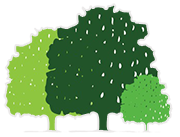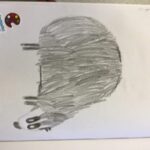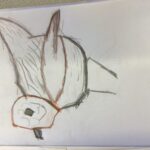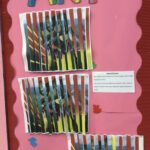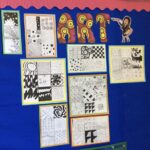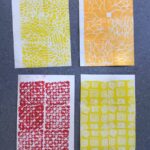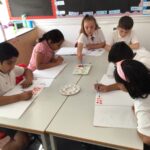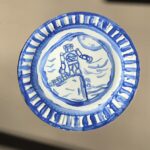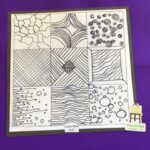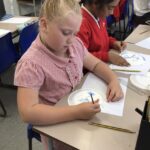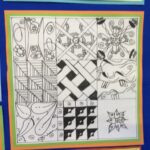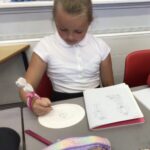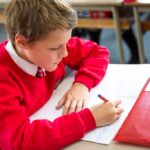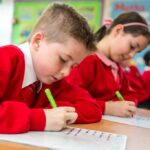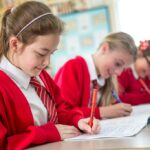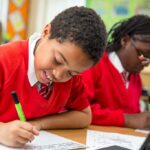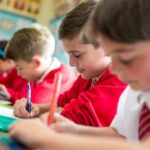Please click on the tabs below to view more information on each subject that we teach here at Parklands Primary School.
Intent
At Parklands Primary School, our art and design curriculum aims to inspire pupils and develop their confidence to experiment and invent their own works of art. Pupils are given opportunities to develop their ability, nurture their talent and interests, express their ideas and thoughts about the world, as well as learn about the rich heritage and culture of the British Isles and beyond.
Our approach to art lessons ensures that pupils meet the National Curriculum end of key stage attainment targets as well as fully covering the National Society for Education in art and design’s progression competencies.
Implementation
EYFS
Through Expressive Arts, children at Parklands Primary, are encouraged to explore different media, explore how media can be combined to create different effects and develop a range of skills and techniques experimenting with colour, design, texture, form and function. Children are given daily access to a range of creative opportunities and enjoy our carefully planned and creative areas both indoors and out. Children are encouraged to create on both small and large scales and our outdoor environment supports this. Children are encouraged to develop their communication and language skills through talking about their creations and sharing these with others to build confidence and raise self-esteem.
KS1 and KS2
Art is taught in every year group, for half a term in autumn, spring and summer.
In Parklands Primary every child has ownership of their sketchbook in order to foster their sense of creativity. It is where they can explore, discover, gather information, experiment, reflect, develop opinions and take risks.
Every child is given the opportunity to learn the skills of drawing, painting, printing, craft and design techniques and sculpture, through the exploration of an artist, craft maker, designer and their work. They evaluate their own work and the work of great artists, craft makers and designers. Teachers follow a clear progression of skills which ensures all pupils are challenged in line with their year group expectations and are given the opportunity to build on their prior knowledge.
Cross-curricular links are promoted, to allow all children to deepen their understanding across the curriculum, including the use of technology, and artworks from year group specific historical, geographical and scientific contexts.
Effective CPD opportunities are available to staff, through AccessArt Primary Split Curriculum, to ensure high levels of confidence and knowledge are maintained.
Impact
The impact of this curriculum will lead to outstanding progress over time across key stages relative to a child’s individual starting point and their progression of skills. We ensure that children who are achieving well, as well as those who need additional support, are identified, and additional provision and strategies are planned and discussed with class teachers. Children will therefore be expected to leave Parklands having met the end of key stage expectations outlined in the National curriculum for Art and Design.
They will be equipped with a range of techniques and the confidence and creativity to form a strong foundation for their Art and Design learning in KS3 and beyond. Our pupils will be enthusiastic Art and Design learners, evidenced by their sketchbooks, final pieces and their pupil voice. Achievements are celebrated in classrooms and in corridor displays. We aim to develop our future artists and their appreciation of the art around them.
Intent
With technology playing such a significant role in society, the computing curriculum is designed to develop children with a wide range of fundamental skills, knowledge and understanding that will prepare them for their future lives. At Parklands, each computing unit has a specific focus: computer science (programming and understanding how digital systems work), information and communication technology (using computer systems to store, retrieve and send information) and digital literacy (evaluating digital content and using technology safely and respectfully).
The objectives within each strand support the development of learning across the key stage, allowing children to revisit their learning and develop their knowledge and understanding in greater depth. At Parklands, we have a collaborative and cross-curricular approach to computing, allowing children to learn together and apply their knowledge from their current topics using different digital platforms. Through teaching computer science, it allows our children to draw on their knowledge of maths and science to become computational thinkers and solve problems through the use of coding.
Through working collaboratively, pupils become increasingly discerning in evaluating online content and their own and others’ work. Ultimately, preparing our pupils for secondary school and to be active participants in a digital world. Online safety is embedded throughout each unit, enabling children to understand how to use technology safely and responsibly. Pupils will leave Parklands Primary School as confident, capable and creative users of digital technology, with a secure understanding of the fundamental principles of computer science and as safe, responsible and discerning digital citizens.
Implementation
We believe that computing plays a crucial part of primary education and is therefore timetabled to be taught weekly to ensure that quality time is dedicated to this subject. Each half term, the timetable is reviewed and modified to suit the topic that is being taught for that period of time. The teachers are then informed whether they will be using the iPads or computing suite throughout their lessons. Additionally, timetables are left in the computing suite for teachers to book out any of the devices when they are available.
At the beginning of each half term, online safety assemblies are also held for KS1 and KS2 to review rules on how to be safe, responsible and respectful online.
Teachers follow a Primary Scheme of Work called Switched On Computing from Rising Stars. Switched On Computing is structured around six units of work per year group, each of which has six sessions, or a half term’s worth of work. There are many ways to link these units to other subjects pupils are studying and suggestions for this are included within the planning. There are also suggested homework activities to provide a bridge from one session to the next.
These should never be seen as essential to completing the unit, but as a way to help engage pupils’ parents/carers with the curriculum content and their child’s learning.
Impact
Computing at Parklands includes a variety of approaches to evaluate the impact of computing lessons and guidance on assessment. The digital artefacts pupils make provide excellent evidence of their developing skills. In most units, there is an opportunity for pupils to share their work with their peers, and to get feedback on what went well, or what might have been even better.
Pupils are encouraged pupils to be constructively critical in their feedback and use these sessions as an opportunity to assess the product of theirs and pupils’ learning using the unit learning outcomes as a guide.
When the children leave Parklands, they will be more aware on:
- Demonstrating and applying the British Values of Democracy, Tolerance, Mutual respect, Rule of law and Liberty.
- Identifying a range of ways to report concerns about content and contact in and out of school.
- Using technology respectfully and responsibly.
- Understanding the need to only select age appropriate content.
- Using a variety of software to design and create content for a given audience.
- Solving problems by decomposing them into smaller parts.
- Using logical reasoning to explain how increasingly complex algorithms work and to detect and correct errors in algorithms and programs efficiently.
- Designing and create a range of programs systems and content for a given audience.
Intent
Design and Technology (D&T) is a vital part of our curriculum as it helps to prepare children to deal with tomorrow’s rapidly changing world. D&T should provide children with a real-life context for learning whilst learning about past and present technology.
At Parklands Primary, children receive a D&T curriculum which allows them to exercise their creativity through designing, making and evaluating. In the EYFS, this is delivered through planned opportunities in the continuous provision. In Key Stage 1, these skills are taught and developed through a theme based curriculum in order to prepare the children for cross curricular opportunities in Key Stage 2. The children are taught to combine these skills with knowledge and understanding in order to design and make a new product for a purpose.
In these fun and engaging lessons, the children will develop their use of technical vocabulary and be inspired by engineers, designers, chefs and architects to enable them to create a range of mechanisms, textiles, electrical systems, structures and food products for a real life purpose. Correct equipment will be chosen and used accurately by the children and methods will be carefully selected to match the task and used effectively. The skills learned in D&T also help with learning across the curriculum. For example, scaling and measuring in mathematics as well as knowledge about properties of materials helps in science.
Intent
At Parklands Primary School, we believe that children should gain an understanding of British and World history taught through themes (KS1) and a chronological narrative: British history and that of the wider world (KS2). In this, students will develop a well-rounded knowledge of the past and its events, with the intention to improve every students’ understanding of the world around them.
For Key Stage 2, the history curriculum is set out in a chronological narrative in order to allow children to reference the previous events in time and to refer to this prior learning across the key stage in order to consolidate their learning.
For Key Stage 1, the history curriculum is taught through a cross-curricular approach to develop an understanding as well as knowledge of certain aspects within their own lifetime and beyond.
Through progressive lessons, we ensure every child is cognitively challenged and has the opportunity to acquire the key historical skills to enable them to think and talk like a historian:
- Chronology
- Interpretation
- Enquiry
- Significance
- Characteristic Features
- Continuity and Change
- Cause and Consequence
As well as developing these key skills across our curriculum, history at Parklands Primary School provides opportunities for child-led activities, supporting them in becoming independent, confident and successful learners. From this, children can create their own structured accounts and analyses. We support children’s high aspirations by liaising with the wider community through a range of workshops, trips and discussions, allowing children to be well-prepared citizens.
Implementation
Teachers create a positive attitude to history learning within their classrooms and reinforce an expectation that all pupils are capable of achieving high standards in history.
In the EYFS and KS1, children focus primarily on history within living memory, using primary and secondary sources to find answers to their questions.
Children in KS1 also engage with figures from history who have contributed to national and international achievements, with an emphasis on those who defied expectations to change the world around them.
From KS2, children engage with ‘periods’ of history for the first time, building chronological understanding by focusing on topics from the Stone Age to the twentieth century and beyond. These topics will be linked to each other for children to understand the chronology and make comparisons. Lessons may be weekly or blocked, depending on the focus. In each topic, the learning is linked to a trip, visit, and experience or analysing of artefacts to provide a real-life context.
We have chosen aspects of history that enable children to pursue important themes relevant to them to make sense of the world today and which link to our values of kindness, creativity and adventure. These include society and power, empire and invasion, innovation and defying stereotypes and expectations, and fairness and discrimination. These themes are pursued and revisited in most areas of historical study as well as other curricular areas to develop a three-dimensional understanding of these concepts. We embed and revisit key vocabulary to develop children’s understanding as they move from EYFS, through KS1 to KS2.
Assessment is ongoing with low-stakes quizzes within lessons to reinforce learning within each unit and pre- and post-topic quizzes. Within each unit of learning, explicit links are made to prior learning, including from earlier years, to reinforce understanding and support children to make links across periods studied. Learning from history will influence understanding and outcomes in other areas of the curriculum, particularly evident in English writing outcomes.
Impact
The successful approach at Parklands Primary will result in a fun, engaging, high-quality History education that provides children with the foundations and knowledge for understanding the world and supports their future learning.
By the time, children in Year 6 leave us; we want them to have the following experiences and understanding:
- Have a secure knowledge of the chronology of British history
- Be able to make connections and contrasts and identify links and trends over time and across times.
- Developed the appropriate use of specific historical terms
- Use a range of sources and understand their strengths/weaknesses
- Describe/make links between main events, situations and changes within and across different periods/societies
- Be immersed in topics in a variety of contexts, including taking part in a variety of trips, visits and experiences
- Recognise how British life and culture have been shaped over time by a huge range of influences from all over the world
- Have an understanding of the similarities and differences between British and wider world history
- Know ways that humans in the past have contributed to innovation for society and exploration of the world
- Regularly address and sometimes devise historically valid questions.
- Construct informed responses by selecting and organising relevant historical information.
- Know how people’s lives have been impacted by decisions made by significant individuals in the past have affected lives.
- Be able to compare modern ideas of fairness and equality to societies of the past and present.
Time Travellers
To promote history across the school, each class have elected a Time Traveller as a representative for this child-led group.
This role involves a range of responsibilities such as:
- Preparing assemblies for significant events and people
- Helping with events such as Remembrance Day
- Keeping the artefacts tidy in the history museum.
- Discussing with pupils how to make history lessons more enjoyable
- Help with the running of Artefact of the Term
It is a fantastic and exciting opportunity to help make the subject come alive.
- History Policy
- History Skills Progression
- Year 5 – The Swinging 60′ s – Part 1
- Year 5 – The Swinging 60′ s – Part 2
Intent
In order to give children the opportunity to become global citizens, they are exposed to a broad Geography curriculum. Our vision is to inspire a curiosity and fascination about the world around them (EYFS) and the world and its people (KS1 and KS2). Our teaching equips pupils with knowledge about places and people, resources in the environment and physical and human processes.
We also want children to develop geographical skills: using map skills and fieldwork to collect and interpret data; and using maps, globes, aerial photographs and digital mapping to name and identify countries, continents and oceans.
High aspirations are developed through differentiated learning opportunities, which enable all children to challenge themselves. This has been implemented with differentiated tasks in all year groups and reflection questions in KS2. At the same time, children are encouraged to work collaboratively on tasks throughout the unit: sharing ideas, deepening understanding and applying their investigative, problem solving and communication skills.
Regular discussions about prior learning (EYFS/KS1) and retrieval and end of unit tasks (KS2) enable children to revisit topics so that they know and remember more, and support teachers to assess learning and progress. The cross curricular approach in EYFS and KS1, and the opportunities to make meaningful cross-curricular links throughout individual units in KS2, help to develop and strengthen children’s understanding and knowledge of geography and the wider world.
We want children to enjoy and love learning about geography by gaining these knowledge and skills, not just through experiences in the classroom, but also with the use of fieldwork and practical experiences, which allow them to broaden their horizons and understand more about people, places and processes.
Implementation
Geography is a vital part of children understanding both their position in the world and wider places; therefore, we have timetabled it to be taught half termly. This way, topics can be explored and children can achieve depth in their learning and the curriculum covered in full. The key knowledge and skills of each topic are mapped across the school, ensuring that knowledge builds progressively and that children develop skills systematically.
Existing knowledge is checked at the beginning of each topic. This ensures that teaching is informed by the children’s starting points so that children build on their prior knowledge each term and each year.
Teachers use the Oddizzi scheme of work to plan and teach their geography lessons. The Oddizzi lesson plans help children to build a solid understanding of people, places and cultures. Teachers and children have access to original learning through the ‘Explore the World’ content which is produced by teachers, geographers and travel-writers.
This consists of images, videos and information allowing teachers and children access to substantive knowledge.
Geography topics at KS1 include:
- Local area
- Weather and climate
- UK
- Hot and cold places
- Continents and oceans
- Mugumareno Village, Zambia
Geography topics at KS2 include:
- Climate zones
- North America
- Rio and South East Brazil
- Rivers
- Rainforests
- South America: The Amazon
- Mountains
- Volcanoes and Earthquakes
- European region: Greece
- UK
- Local area and region
In KS2 in particular, there are a lot of opportunities for children’s research to link with literacy and for them to apply their reading skills to non-fiction. Furthermore, some of the English units within the year group link with the topics. History also links with the topics when looking at the local area, as well as orienteering in PE.
A variety of teaching strategies are used to engage and interest children and further their learning, such as enquiry-lead learning, collaborative work, use of computer mapping software and opportunities to communicate their ideas to each other and with teachers including discussions and presentations.
Map skills are embedded throughout the units; in KS1 the focus is on being able to read and draw a simple map, using positional language. During KS2, this progresses to children being able to use globes, maps (including digital maps) and atlases to identify a range of places and features studied.
Children look at 4 figure grid references and the 4 points of a compass in years 3 and 4; this builds to 6 figure grid references and 8 compass points in year 5 and 6. Moreover, each year group in KS2 has its own stand-alone map lesson which links to the curriculum that year, using the Royal Geographical Society map work lessons.
Fieldwork is completed within each group:
- KS1: Local area walk
- KS2: A study of particular physical and human features; river study; microclimates and Local area survey
There are opportunities for children to collaborate and present their findings following the fieldwork.
We hope that our curriculum encourages children to develop a sense of enquiry, fascination and curiosity about the world around them as well as an understanding of relevant knowledge that they will need in the future.
Impact
Our geography curriculum offers high quality and well planned lessons which encourage progression. Geographical questioning helps pupils to gain a coherent knowledge and understanding of the world and its people.
- Children will have a good sense of place and a confident understanding of similarities and differences between places studied.
- Children will be able to apply their reading skills for the purpose of furthering geographical knowledge and understanding
- Children will be able to read and interpret maps confidently including digital maps
- Children will be able to relate to the world around them through an understanding of its physical and human features
- Children will be able to articulate their understanding and knowledge using a wider vocabulary of geographical terms.
- Children will be able to develop their geographical skills, such as, evaluation, creativity, problem solving and enquiry.
- End of unit challenges, ongoing assessments and target tracker steps will be used to promote progress.
- Geography Curriculum Overview
- Geography Policy
- Geography Skills Progression
- How map skills are used during geography lessons
- PrimeVR
Reading
Intent
At Parklands Primary School, our vision is to create enthusiastic and motivated readers who possess a lifelong love for literature. The secure phonics knowledge that we aim for pupils to obtain by the end of Key Stage One, ensures that children are instilled with skills to both decode words in order to read fluently and to comprehend what they have read. Reading promotes higher order thinking which extends to analysing authors’ intent and participating in high-quality discussions about texts, building on their own and other’s ideas and challenging views courteously.
From Early Years Foundation Stage to Year Six, we nurture a home-school partnership, which enables parents and carers to understand how to enhance the skills that pupils learn at school. Pupils are able to apply the skills learnt in reading lessons across the curriculum. Children are encouraged to read for a range of purposes, including reading for pleasure. Teachers aim to establish a love and appreciation for reading. In order to support this, each classroom has a ‘Reading Challenge’ which encourages pupils to read at home on a regular basis.
Our Reading curriculum is inclusive, providing opportunities for all pupils to develop their skills and knowledge to become independent, confident and successful readers. It is cognitively challenging, ambitious and engaging, ensuring it delivers the requirements of the National Curriculum. Pupils are exposed to a wide range of authors. Reading texts are chosen by taking into account contextual and environmental factors as well as focusing on the individual children at Parklands.
This helps them to understand more about the world they live in through the knowledge they gain from texts. Progression across the school is clear, taking into consideration pupils starting points as well as end of Key Stage expectations; units of work are accessible and sequenced to ensure that all children are able to make progress.
Implementation
With our intent in mind and to provide consistency in our phonic teaching to further improve results, Parklands Primary follow the Read Write Inc. approach to teaching phonics in EYFS, KS1 and for those children who required further phonic intervention in KS2. This is a systematic, synthetic approach to teaching phonics.
Parklands Primary place great importance on speaking and listening in our Early Years and we teach different aspects and levels of phonological awareness in our Nursery provision. We focus on sound discrimination, rhythm, rhyme, oral blending and segmenting, sound talk and enhancing our children’s vocabulary.
A text-based learning approach is followed during English lessons. Core Texts have been chosen for each year group but there is scope for change if necessary.
A wide range of effective questioning will be used during class discussions to challenge, probe and extend children’s understanding and learning. Texts are analysed by either responding in writing or completing some explicit vocabulary teaching using words from the text.
Reading is not only celebrated in classrooms at Parklands Primary, but around school there are displays which celebrate authors, children’s favourite books and children’s work based upon texts. In addition, throughout the school year the importance of reading is enhanced through World Book Day, author and poet visits, parent reading sessions and a range of trips and visits which enrich and complement children’s learning.
As Parklands believe consistency and well-taught English is the core of a valuable education, we ensure that the teaching of reading and writing is purposeful, robust and shows clear progression for all children.
Impact
The impact on our children is clear: progress, sustained learning and transferrable skills.
Parklands aims that by the end of KS2 all of our children have made considerable progress from their starting points in EYFS.
Our children also become more confident, fluent readers and they realise the importance of reading for pleasure along with reading for information and knowledge.
All aspects of English are an integral part of the curriculum. Cross curricular reading and skills taught in English lessons are transferred into other subjects; this shows consolidation of skills, progression and a deeper understanding of texts read.
We hope that as children move on from us to further their education and learning that their creativity, passion for English and high aspirations travel with them and continue to grow and develop as they do.
Writing
Intent
Our vision is to create confident, motivated writers who possess a love of writing and have pride in their written accomplishments. All children, from Foundation Stage to Year Six, are provided with many opportunities to develop and apply their ‘early mark making’ and writing skills across the curriculum. Throughout Key Stages One and Two, pupils plan, draft and edit their writing, focusing on effective transcription and composition. Through their writing, pupils are given a voice to share their ideas and emotions with their community.
Through embedding basic skills in order to widen their knowledge and understanding of vocabulary and grammar, pupils are able to articulate, communicate and organise their ideas, taking into consideration their audience and purpose for writing. We nurture our pupils as eloquent and articulate speakers and writers, who use a wide and purposeful vocabulary. We provide varied and exciting opportunities for writing and purpose, encouraging pupils to view themselves as authors and poets.
Our broad, balanced and inclusive writing curriculum, which utilises objectives from the National Curriculum, ensures that every child is provided with the skills required to be confident and independent authors. Progression across our well-defined writing curriculum is clear, taking into account pupils’ starting points as well as end of Key Stage expectations; units of work are accessible and sequenced to ensure that all children are able to make progress.
Implementation
As part of the RWI programme of learning, teachers follow the “Get Writing” scheme where children develop their understanding of what they have read and the vocabulary they have explored in their written work. Writing is linked to the weekly texts shared and covers a range of writing skills and elements.
Beyond RWI in KS1 and into KS2, a text-based learning approach is followed during English lessons. Core Texts have been chosen for each year group but there is scope for change if necessary.
In order to expose children to a variety of genres which helps to utilise and embed the writing skills, teachers use a variety of recommended texts to plan, structure and teach their English lessons. This is designed to show progress, teach the pertinent year group objectives, apply and consolidate these skills and develop vocabulary.
Through the use of high quality texts, children are exposed to inference, high-level vocabulary, a range of punctuation and characterisation. Each text is purposefully selected in order to promote a love of reading, engagement and high quality writing from each child.
Teachers model writing objectives during whole class teaching and Guided Writing sessions will be used to meet specific objectives for individuals or groups. Opportunities will be provided to reflect and edit their work whilst drafting – teachers gauge when these times are best. Opportunities will be given to act on marking. In years 1 – 6 teaching will take place as a daily lesson but in Foundation Stage elements may be taught throughout the day. High standards and general English subject knowledge will be reinforced continually throughout all subjects.
Spellings are to be taught in separate spelling sessions but also continuously throughout the school day. All children are to be taught their year group word list, whilst also revising previous year’s lists. Through Sounds Write lessons in KS1 and spelling sessions in KS2, children are to be taught their year groups spelling patterns. We have additional streamed Sounds Write intervention for children where extra support is required throughout KS1 and 2 (e.g. those children who did not pass the Year One phonics screening test or the resit in Year 2).
In line with the National Curriculum, each year group is taught the explicit grammar, punctuation and spelling objectives required for that age group. As well as teaching the objectives, teachers are able to embed the skills throughout the year in cross-curricular writing opportunities and aim for all children to achieve the objectives at the expected level and that some children can achieve at a greater depth standard. In this sense, assessment of writing is also more fluid as teachers can assess against a set framework.
All year groups use the same format for assessing writing, reading and GPS which have been produced in line with the end of Key Stage assessment frameworks as published by the Department for Education. We record our assessments and track progress through Target Tracker.
Impact
The impact on our children is clear: progress, sustained learning and transferrable skills.
Parklands aims that by the end of KS2 all of our children have made considerable progress from their starting points in EYFS.
With the implementation of the writing journey (including mastering of the phonics) being well established and taught thoroughly in both key stages, our children are becoming more confident writers.
By the time they are in upper Key Stage 2, all genres of writing are familiar to them and teaching can focus on creativity, writer’s craft, sustained writing and manipulation of grammar and punctuation skills.
All aspects of English are an integral part of the curriculum. Cross curricular writing and skills taught in English lessons are transferred into other subjects; this shows consolidation of skills, progression and a deeper understanding of how and when to use specific grammar, punctuation and grammar objectives.
We hope that as children move on from us to further their education and learning that their creativity, passion for English and high aspirations travel with them and continue to grow and develop as they do.
English at Parklands Primary School
English has a prominent place in education and in society. A high-quality education in English will teach pupils to speak, read and write fluently so that they can communicate their ideas and emotions to others. Through literacy, pupils have a chance to develop culturally, emotionally, intellectually, socially and spiritually.
The overarching aim for English in the National Curriculum is to promote high standards of language and literacy by equipping pupils with a strong command of the spoken and written word, and to develop their love of literature through widespread reading for enjoyment. The National Curriculum for English aims to ensure that all pupils:
- read easily, fluently and with good understanding
- develop the habit of reading widely and often, for both pleasure and information
- acquire a wide vocabulary, an understanding of grammar and knowledge of linguistic conventions for reading, writing and spoken language
- appreciate our rich and varied literary heritage
- write clearly, accurately and coherently, adapting their language and style in and for a range of contexts, purposes and audiences
- use discussion in order to learn; they should be able to elaborate and explain clearly their understanding and ideas
- are competent in the arts of speaking and listening, making formal presentations, demonstrating to others and participating in debate.
Please click on the link to view.
National Curriculum Year 3 & 4 Word List – Year 3&4 Spelling Word List (page 16)
National Curriculum Year 5 & 6 Word List – Year 5&6 Spelling Word List (page 23)
The Read Write Inc. Phonics programme
Intent
At Parklands Primary School, our intent for the teaching and learning of maths is to provide our pupils with a solid foundation of mathematical fluency, reasoning, and problem-solving skills. We aim to foster a deep understanding and love for maths, enabling pupils to use their mathematical knowledge confidently in real-life situations both within and outside the classroom. By delivering a rich and stimulating maths curriculum, we intend to equip our pupils with the essential skills they need for future education and employment.
Implementation
High-Quality Curriculum:
We have a well-sequenced and progressive maths curriculum that is in line with the National Curriculum requirements and follows the White Rose Schemes of learning. Our curriculum ensures appropriate coverage of key mathematical concepts and topics, while also incorporating opportunities for reasoning, problem-solving, and the application of mathematical skills. We continuously review and adapt our curriculum to ensure it remains relevant and engaging for all pupils.
Effective Teaching and Learning:
Our teachers are skilled in delivering effective maths lessons that are inclusive and cater to the needs of all learners. They use a variety of pedagogical approaches and resources to make the subject accessible and engaging for all pupils. Lessons are carefully planned to introduce new concepts, provide opportunities for practice and consolidation, and encourage pupils to reason and develop their problem-solving abilities.
Differentiation and Personalisation:
We recognise that pupils have differing abilities and learning styles, so we use a range of strategies to differentiate and adapt classroom activities, and support individual needs. Our teachers provide targeted interventions to close learning gaps and challenge more able learners. We also use formative assessment techniques to continually evaluate and adjust our teaching approaches to meet the needs of every pupil.
Resources:
We provide a wide range of manipulatives, visual representations, and mathematical resources to support pupil understanding and exploration to enhance pupils’ engagement and understanding of mathematical concepts.
Enrichment Opportunities:
We offer a variety of enrichment opportunities to enhance pupils’ mathematical experiences. This includes participating in local maths challenges and competitions, inviting external experts to deliver workshops, and organising maths-themed events within the school community. These opportunities deepen pupils’ enjoyment and understanding of maths, fostering a positive attitude towards the subject.
Professional Development:
Our teachers engage in regular professional development, staying up-to-date with the latest educational research and effective pedagogical approaches in maths.
Impact
Achievement and Progress:
Through our teaching and well-structured curriculum, our pupils achieve well in maths. They make good progress, acquiring secure mathematical knowledge, skills, and understanding appropriate for their age. Our assessment systems accurately measure pupil progress and inform our future planning, ensuring targeted support and challenge when necessary.
Attainment and Enjoyment:
Pupils’ attainment in maths is good, with a large proportion of pupils achieving at or above age-related expectations. Our pupils develop a genuine love for maths, engaging in lessons with enthusiasm and perseverance. They understand the relevance of maths in real-life situations and are confident in applying their mathematical skills in different contexts.
Confidence and Resilience:
Our maths teaching nurtures pupils’ confidence and resilience. Pupils are encouraged to take risks, engage in mathematical discussions, and explore multiple strategies to solve problems. They demonstrate resilience when faced with challenging tasks, persevering to find solutions independently or collaboratively.
Positive Attitudes and Inclusion:
We foster positive attitudes towards mathematics, promoting a growth mindset and dispelling the myth that maths is difficult or inaccessible. We celebrate mistakes as opportunities for learning and create a supportive and inclusive learning environment where all pupils feel valued and empowered to contribute.
Monitoring and Evaluation:
We adopt a rigorous system of monitoring and evaluation to continuously improve the quality of maths provision. Regular classroom observations, pupil work scrutiny, and data analysis help us identify areas for development and provide targeted support to teachers. We also seek feedback from pupils and staff to evaluate the impact of our teaching and make informed adjustments.
By successfully implementing this intent statement, we ensure that our pupils leave Parklands as confident, competent, and enthusiastic mathematicians, prepared for the mathematical challenges ahead in their education and future lives.
Intent
At Parklands Primary School, our vision is to create a high-quality languages education which fosters pupils’ curiosity and deepens their understanding of the world. It enables pupils to express their opinions and beliefs in another language and to understand and respond in both written and verbal form. It allows pupils to communicate, read and explore different cultures, paving the way for learning further languages and equipping pupils to study and work in other countries.
The MFL curriculum that pupils learn at Parklands focuses on enabling children to make substantial progress in the chosen language: French. Teaching lays the foundations for further learning, providing opportunities to recall and build upon previous language knowledge and skills. It enables pupils to understand and communicate ideas, facts and feelings in speech and writing, focused on familiar and routine matters, using their knowledge of phonology, grammatical structures and vocabulary.
Pupils are taught to:
- listen attentively to spoken language and show understanding by joining in and responding
- explore the patterns and sounds of language through songs and rhymes and link the spelling, sound and meaning of words
- engage in conversations; ask and answer questions; express opinions and respond to those of others; seek clarification and help
- speak in sentences, using familiar vocabulary, phrases and basic language structures
- develop accurate pronunciation and intonation so that others understand when they are reading aloud or using familiar words and phrases
- present ideas and information orally to a range of audiences
- read carefully and show understanding of words, phrases and simple writing
- appreciate stories, songs, poems and rhymes in the language
- broaden their vocabulary and develop their ability to understand new words that are introduced into familiar written material, including through using a dictionary
- write phrases from memory, and adapt these to create new sentences, to express ideas clearly
- describe people, places, things and actions orally and in writing
Intent
At Parklands Primary School, we recognise the importance of PE and the role it has to play in promoting long-term, healthy lifestyles. Through carefully sequenced and progressive lessons, alongside extensive extra-curricular opportunities, children are provided with a high quality physical and sport education – enabling all children to have the knowledge and skills to succeed. It is our vision for every pupil to be appropriately challenged so that they can excel and reach their full potential; we strive to inspire our pupils through fun and engaging PE lessons that are accessible to all.
Through our teaching of PE, we provide opportunities for pupils to develop values and transferrable life skills, such as teamwork and respect, as well as providing them with opportunities to take part in competitive sport. Additionally, we ensure that sporting competence is developed through a broad range of physical activities, which are carried out for sustained periods of time to not only promote a healthy and active lifestyle, but to foster an enjoyment and love of sport.
Implementation
- PE at Parklands Primary School provides challenging and enjoyable learning through a range of sporting activities including; invasion games, net & wall games, strike and field games, gymnastics, dance and swimming.
- The long term plan sets out the PE units which are to be taught throughout the year and ensures that the requirements of the National Curriculum are fully met.
- Pupils in KS1 and KS2 participate in two high quality PE lessons each week, covering two sporting disciplines every half term. These are either taught by the class teacher or by a PE teacher who have received training and support.
- In addition, children are encouraged to participate in the varied range of extra-curricular activities and children can attend after school sport clubs. We offer a wide range of sporting after-school clubs run by both teaching staff and outside agencies such as Premier Sport.
- Children are invited to attend competitive sporting events within the local area. This is an inclusive approach which endeavours to encourage not only physical development but also mental well-being. These events also develop teamwork and leadership skills and are very much enjoyed by the children.
- Each year a small group of Year 6 children are invited to become Sports Leaders for the school. They develop into sporting role models for the younger children, assisting with lunch-time clubs, our annual Sports day and any other Sporting activities.
- Children in Year 5 attend weekly swimming lessons teaching them how to swim, how to become stronger swimmers and water safety.
- Each lesson, children are given the opportunity to practise skills in a variety of ways and each lesson builds upon the previous skills, allowing them time to embed it. Different skills are recapped throughout, and across, the years, each time they are being built upon; allowing children to know more and remember more.
- Teachers follow a Primary Scheme of Work called PE Passport. PE Passport has a variety of different sporting activities from Early Years – Year 6 and it is used, adapted and developed by staff to ensure quality lessons are being delivered.
Impact
Our curriculum aims to improve the wellbeing and fitness of all children at Parklands Primary School, not only through the sporting skills taught, but through the underpinning values and disciplines that PE promotes. We help motivate children to participate in a variety of sports through quality teaching that is engaging and fun.
From our lessons, our children learn to take responsibility for their own health and fitness, many of whom also enjoy the success of competitive sports. We equip our children with the necessary skills and a love for sport. They will hopefully grow up to live happy and healthy lives utilising the skills and knowledge acquired through PE.
Through strong links with PHSE we promote the overall well-being and health of each child through teaching about self-discipline and that to be successful you need to take ownership and responsibility of their own health and fitness. In all classes, children possess a wide range of physical abilities.
Whilst recognising this fact, we provide suitable learning opportunities for all children by matching the challenge of the task to the ability of the child. Children will also use fitness and sports to improve their physical and mental health throughout their lives.
For upcoming sporting events, please subscribe to our calendar.
Take a look at our latest news and events page and read our newsletters to find out more.
Please also take a look at our clubs page to find out more about joining one of our extra-curricular sporting opportunities.
Vision
At Parklands Primary School, personal, social and health education (PSHE) enables our children to become healthy, independent and responsible members of a society and it is an embedded part of our broad and balanced curriculum. It aims to help them understand how they are developing personally and socially, and tackles many of the moral, social and cultural issues that are part of growing up.
Pupils’ spiritual, moral, social and cultural (SMSC) development is fully at the heart of our school ethos. British Values are promoted through the overarching aims and objectives of PSHE by supporting our children to become healthy and responsible members of society, as well as preparing them for life and work in modern Britain.
Intent
At Parklands Primary School, we recognise the importance of personal, social, health and economic (PSHE) education and the role it plays in developing our pupils into healthy, independent, and responsible individuals who are prepared for life and work. Our curriculum builds upon the children’s first stages of development in EYFS through progressive and sequenced topics, which revolve around three key themes: relationships, health and wellbeing and living in the wider world. Within the study of PSHE, our children develop the knowledge, skills, and attributes they need to manage their lives, now and in the future.
The quality PSHE that not only is taught but embedded in our ethos at Parklands Primary School and ensures children are given wide perspectives to the diverse society that we live in today. Pupils develop fully as:
- individuals as they focus on their own personal development; believing in themselves, building resilience, developing habits to lead a healthy life.
- members of families and social communities; understanding how to relate to others and adopt teamwork skills
- members of economic communities; developing their awareness of the part that they play and how to live responsibly.
It is essential that we teach PSHE to provide the link between pupils’ health and wellbeing, and their academic progress. We know the value of focusing on promoting positive behaviour, mental health, wellbeing, resilience, and achievement will impact their whole education.
Implementation
We believe that PSHE plays a vital part of primary education and is therefore timetabled to be taught at least weekly to ensure that quality time is dedicated to these areas. There are always occasions where teachers may feel it necessary to teach PSHE as a result of an issue that has arisen in their own class.
Many objectives from the curriculum will also be covered as an important part of school assemblies, where children’s spiritual, moral, social and cultural curiosity is stimulated, challenged and nurtured. The distribution of the lessons complements key campaigns throughout the year, such as National Anti-bullying Week and E-safety Week.
Teachers follow a Primary Scheme of Work called SCARF – Safety, Caring, Achievement, Resilience, Friendship (Coram Life Education). Developed by teachers and centred on a values-based and ‘Growth Mindset’ approach, SCARF’s lesson plans and resources help to promote positive behaviour, mental health, wellbeing, resilience and achievement. There is now a proven link between pupils’ health and wellbeing, and their academic progress.
Crucial skills and positive attitudes developed through comprehensive Personal, Social, Health and Economic education (PSHE) are critical to ensuring children are effective learners and SCARF provides a whole-school approach to building these essential foundations – crucial for children to achieve their best, academically and socially.
SCARF lesson plans are organised around the PSHE Association’s Programmes of Study Learning Opportunities, which includes three core themes of Health and Wellbeing; Relationships; and, Living in the Wider World. These themes have been broken down into six main areas for termly coverage, and are ordered as follows:
- Me and My Relationships
- Valuing Difference
- Keeping Myself Safe
- Rights and Responsibilities
- Being my Best
- Growing and Changing
In addition to dedicated PSHE lessons, many other curriculum subjects make a link to PSHE, British Values, SMSC and the language is used consistently by all staff. British Values and SMSC displays throughout the school also reinforce the PSHE curriculum, further enabling children to make links.
Beyond our documented curriculum, it is hoped that the school’s values provide a culture that contributes equally towards the pastoral development of our children. Therefore, our teaching approach places great emphasis upon collaboration and cooperation: group work should be a key element of all classrooms, enabling our pupils to achieve success together. Beyond this, pupils are encouraged to show leadership in their community through Student Council.
At Parklands Primary School, our PSHE curriculum demonstrates appropriate subject knowledge, skills and understanding to fulfil the statutory duties of the Relationship Education (RE), Relationship and Sex Education (RSE) and Health Education (HE) curriculums. It is hoped that our overall curriculum is designed to directly support the pastoral education of our pupils as well as the academic outcomes that the school aims for.
Impact
- Children will demonstrate and apply the British Values of Democracy, Tolerance, Mutual respect, Rule of law and Liberty.
- Children will demonstrate a healthy outlook towards school – attendance will be in-line with national and behaviour will be good.
- Participation in extra-curricular activity both in school and beyond is encouraged and celebrated.
- Pupil Voice Surveys are used to assess knowledge of how to stay safe and emotionally confident within the school.
- Children will become healthy and responsible members of society.
- Levels of volunteering both within the school through litter picking, librarians and playground leaders, and within the community through choir concerts within local care homes and supporting the local foodbank.
- Children will achieve age related expectations across the wider curriculum.
- Children will be well prepared for their journey preparing them for life and work in modern Britain.
Please click on the link to view documents.
RSE Policy and Information
- School guide for parents
- RSE Policy
- RSE Consultation Feedback
- RSE – Appendix 2
- RSE Appendix 2.1
- RSE – Appendix 3 from RSE Policy
PSHE Curriculum
- PSHE Long Term Overview
- PSHE Skills Progression
- PSHE Year Overview
- PSHE Coverage Overview (RSE & Health)
- PSHE Association Mapping
- SMSC Curriculum Mapping
Harold’s Daily Diary
Each day, our happy, healthy giraffe mascot, will be giving children positive, fun messages about what he’s doing to stay happy and healthy while he’s off school, separated from his friends. He’ll invite the children to join in activities which will be family-friendly, varied and tailored to all ages, follow his Daily Plan and download and fill in their own version.
Topics will include:
- Taking regular exercise
- Being creative
- Helping others
- Connecting with others – in ways that are safe
- Mindfulness – learning to enjoy the moment, here and now.
You can follow Harold @CoramLifeEd (Twitter) or @CoramLifeEducation (Facebook) each day to see what he is up to!
Mental Health Support
The current Coronavirus (COVID-19) outbreak has seen a huge change in the way we run our day-to-day lives which will have a big impact on our mental health. While it is important to stay informed, there are also many things we can do to support and manage our wellbeing during this time. The resources listed below provide guidance and help parents to support the wellbeing of our children and explain Coronavirus in a way that is child-friendly.
There are also a range of activities that promote positive mental health and are fun for all the family to complete.
If you’re struggling to explain Coronavirus to your child and reassure them at this unsettling time, let nurse Dotty and Dave the dog help.
Mindfulness activities for children
Teacher Starter – Mindfulness activities for the classroom
https://www.coramlifeeducation.org.uk/harolds-daily-diary for exciting stories and activities
Intent
The purpose of RE at Parklands Primary School is to engage pupils in exploring and responding to challenging questions raised by religion and worldviews.
Learning in the Early Years Foundation Stage focuses on exploration of artefacts and stories through continuous provision, linking particularly to the Early Learning Goal of ‘Exploring the World’. While Key Stage 1 builds upon these stories, gaining knowledge of key religions, their beliefs and festivals, the Key Stage 2 curriculum requires children to ask and answer bigger questions about the world, revisiting and applying their knowledge of worldviews.
The ‘spiral’ design of the curriculum allows for the children to become religiously literate, laying the foundations for a progression of knowledge, understanding and skills needed to appreciate and appraise varied responses to questions. Inclusive teaching and learning, during both RE lessons and collective worship, allows children to gain a broad knowledge of major religions and worldviews reflected in the local, national and wider global community.
RE at Parklands Primary School aims to help all pupils to appreciate the way that religious beliefs shape life and behaviour and develop the ability to make reasoned and informed judgements about religious and moral issues. RE will also enhance their spiritual, moral, social and cultural development. Their acquired learning, through teaching and first-hand experience from religious visitors and trips, will enable pupils to combat prejudice, preparing them for adult life, employment and life-long learning.
Implementation
Curriculum
Every child at Parklands has a right to share their beliefs, religions and/or worldviews and to respect those of others too. Our RE curriculum follows the Havering scheme of work, which aims to provide opportunities for all pupils to learn and achieve. It promotes pupil’s spiritual, moral, social and cultural development and prepares children for the opportunities, responsibilities and experiences of life. It is underpinned by the school’s core values.
RE at Parklands offers a safe and secure space during curriculum time for reflection, discussion and debate, allowing children to build their reasoning and cognitive skills.
Organisation and planning
RE will be taught through:
- Discreet individual lessons
- Whole school/Key Stage celebrations such as RE days or multi-cultural themed events
- Assemblies, class discussions and circle time
- Cross-curricular opportunities; childrens’ skills in Literacy will be enhanced, as well as problem-solving, decision-making and interpersonal skills.
Our long and medium term plans ensure that there is progression throughout the school and that children are building upon knowledge learnt in previous years. The topics are designed so that pupils develop knowledge and understanding of the principal religions in the UK and Christianity is taught as a core religion in both key stages.
Our Local Authority based scheme of work ensures that pupils have encountered and explored the religions through the EYFS and Key Stages 1 and 2. We use a combination of teaching RE through the creative curriculum and as a separate subject, depending on the material which has to be covered.
Short term planning of individual lessons is organised by the class teacher. The RE Subject Lead is available to help with this. When planning each unit of work the teacher will identify which parts of the programme of study are to be the focuses. The work planned must be relevant to the needs of all pupils.
Roles and responsibilities
Head of School
The governing board will approve the RE policy, and hold the head teacher to account for the implementation of this.
RE lead
The RE lead (Miss Brogan and Miss Cockerton) is responsible for:
- Ensuring that RE is taught consistently and in accordance with our scheme of work across the school.
- Ensure attainment and progression across the school
- Being available to advise and work alongside colleagues for successful planning, delivering and assessment of RE
- Co-ordinating RE based events
Staff
Staff are responsible for:
- Delivering RE using sensitive and inclusive approaches
- Modelling positive attitudes towards RE
- Monitoring progress
- Responding to the needs of individual pupils
- Assessment of RE
Pupils
Pupils are expected to engage fully in RE and to treat others with respect and understanding during discussions and debates. Pupils are expected to work to their full potential and demonstrate clearly their knowledge and understanding of each lesson.
Parents’ right to withdraw
At this school it is our practice to talk to parents to ensure that they understand the aims and value of the RE curriculum before honouring the right of withdrawal from RE. Any parent who wishes to withdraw their child is expected to consult the head teacher.
Parents hold the right to withdraw their children from RE on the grounds that they wish to provide their own religious education. (School Standards and Framework Act 1998 S71 (3)). This will be the parents’ responsibility.
Impact
Staff training
The training of RE is included in our continuing professional development (CPD) calendar and whole school training needs are included in action plans. Our school ensures they are kept informed of relevant changes to aspects of RE by regularly attending LA meetings. The RE lead (Miss Brogan and Miss Cockerton) is also always available to provide support and advice should members of staff require this.
Monitoring & Assessment
The delivery of RE is monitored by the RE lead through:
- Pupil voice/ pupil discussions
- Learning walks
- Book looks
- Professional discussions with members of staff
This is to ensure the following:
- Curriculum delivery is accurate and effective
- The impact of RE in the classroom
- Demonstration of progress and attainment
- Understanding resource and staff training requirements
In Early Years, children are assessed against EYFS Development Matters in Nursery and Reception against Understanding the World (UW).
Teacher assessment is carried out on an ongoing basis using the Target Tracker assessment programme. The Class Teachers are responsible for the day-to-day organisation of the curriculum. They monitor the weekly lesson plans, ensuring that all classes are taught the full requirements of the agreed schemes of work, and that all lessons have appropriate learning objectives.
This policy is monitored by Parklands Primary SLT and will be reviewed every year by staff.
Intent
The National Curriculum states, ‘A high-quality science education provides the foundations for understanding the world through the specific disciplines of biology, chemistry and physics. Science has changed our lives and is vital to the world’s future prosperity, and all pupils should be taught essential aspects of the knowledge, methods, processes and uses of science.’
The national curriculum for science aims to ensure that all pupils:
- develop scientific knowledge and conceptual understanding through the specific disciplines of biology, chemistry and physics
- develop understanding of the nature, processes and methods of science through different types of science enquiries that help them to answer scientific questions about the world around them
- are equipped with the scientific knowledge required to understand the uses and implications of science, today and for the future
- develop an enthusiasm and enjoyment of scientific learning and discovery
- develop the essential scientific enquiry skills to deepen their scientific knowledge
At Parklands Primary School, we recognise the importance of science as a core subject, and we give the teaching and learning of the subject the prominence it requires. The scientific area of learning is concerned with increasing pupils’ knowledge and understanding of our world and with developing skills associated with science as a process of enquiry. Science at Parklands develops the natural curiosity of the child and allows them to ask and answer challenging questions and successfully carry out investigations.
The National Curriculum provides a structure and skills development for the science curriculum being taught throughout the school, which, where possible, links to learning across a range of subjects to allow for a depth of learning. Additional opportunities are provided in science through our enrichment activities and partnership with a leading science specialist school – Royal Liberty.
We endeavour to ensure that the science curriculum we provide will give children the confidence and motivation to continue to further develop their skills into the next stage of their education and life experiences.
Implementation
Teachers create a positive attitude to science learning within their classrooms and reinforce an expectation that all pupils are capable of achieving high standards in science. Our whole school approach to the teaching and learning of science involves the following:
- Science is taught in planned and arranged topic blocks, using the National Curriculum to provide a structure and skills development for science being taught. Where possible, links to learning across a range of subjects are used to enable the achievement of a greater depth of knowledge. In KS1, science is linked to a theme and science lessons are taught discreetly within that theme.
- In the EYFS, continuous provision is in place to support children in meeting the Early Learning Goals; this is covered through the year, based on themes, children’s interests and the time of the year.
Existing knowledge is checked at the beginning of each topic, asking children what they already know. This ensures that teaching is informed by the children’s starting points and allows teachers to adapt planning if current understanding does not align with the learning progression document. - Through our planning, we involve problem solving opportunities that allow children to apply their knowledge, and find out answers for themselves. Children are encouraged to ask their own questions and are given opportunities to use their scientific skills and research to discover the answers. This curiosity is celebrated within the classroom.
- The delivery of science aims to be engaging, often involving high-quality resources to aid understanding of conceptual knowledge.
- Teachers use precise questioning in class to test conceptual knowledge and skills, and assess pupils regularly to identify those children with gaps in learning, so that all pupils make sufficient progress and are prepared for their next stage of learning. Tasks are selected and designed to provide appropriate challenge to all learners, in line with the school’s commitment to inclusion.
- To support the retention of knowledge, children are provided with a knowledge organiser at the beginning of every unit which is engaged with regularly during the course of a topic.
- In KS1, teachers have access to a range of questions to ask their children based on their knowledge organiser to support retention of key knowledge; these questions are engaged with throughout a topic studied.
- We build upon the knowledge and skill development of the previous years. As the children’s knowledge and understanding increases, they become more proficient in selecting, using scientific equipment, collating and interpreting results, they become increasingly confident in their growing ability to come to conclusions based on real evidence.
- Working Scientifically skills are embedded into lessons to ensure that skills are systematically developed throughout the children’s school career and new vocabulary and challenging concepts are introduced through direct teaching. This is developed through the years, in-keeping with the topics.
- Teachers demonstrate how to use scientific equipment, and the various Working Scientifically skills in order to embed scientific understanding. Teachers find opportunities to develop children’s understanding of their surroundings by accessing outdoor learning and workshops with experts.
- Children are offered a wide range of extra-curricular activities, visits, trips and visitors to complement and broaden the curriculum; these are purposeful and link with the knowledge being taught in class.
- We have established a partnership with a leading science specialist school – Royal Liberty – who help to inspire children’s curiosity in the subject and support the primary to secondary transition.
- Regular events, such as Science Week, allow all pupils to come off-timetable, to provide broader provision and the acquisition and application of knowledge and skills.
- At the end of each topic, key knowledge is reviewed by the children and rigorously checked by the teacher and consolidated as necessary.
Impact
- The successful approach at Parklands Primary will result in a fun, engaging, high-quality science education, that provides children with the foundations and knowledge for understanding the world and supports their future learning.
- Frequent, continuous and progressive learning outside the classroom is embedded throughout the science curriculum which will support children as they progress in their scientific learning across the primary phase.
- Through various workshops, trips and interactions with experts, children will have the understanding that science has changed our lives and that it is vital to the world’s future prosperity.
- Children at Parklands Primary will enjoy science and result in motivated learners with secure scientific understanding.
- Children will participate in extra-curricular activity beyond the school day.
- Pupil surveys will affect the way in which science is delivered in the school.
- Children will achieve age-related expectations across the curriculum.
- Science Policy
- Skills Progression Map
- Parklands’ Science Principles
- Recommended Reading List for Science
- World Science Day
